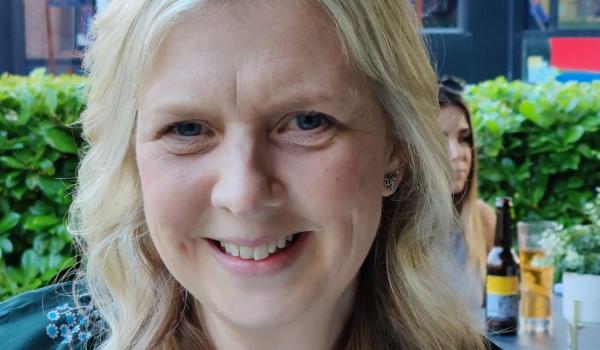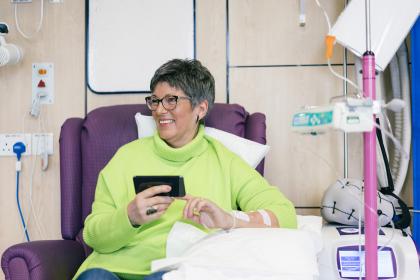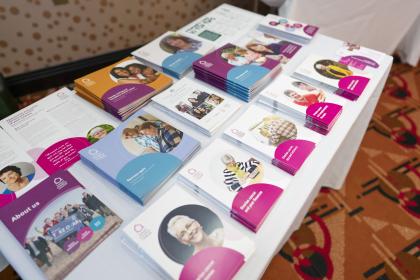Rachel understands how important it is for GPs to receive training so they can spot the signs and increase the chances of early diagnosis. To help raise awareness of GP training, Rachel decided to share her story in our BBC Lifeline Appeal...
I feel incredibly grateful to have been well for so long – though my story hasn’t been without its challenges.
I first found out I had stage III ovarian cancer about eight years ago, after a very difficult time while I waited to get a diagnosis. I knew something was wrong. I first began to notice symptoms a good six months before – the main one was an unusual discharge. I didn’t have many of the typical symptoms you’d associate with ovarian cancer, except perhaps some bloating, which made diagnosis difficult.
GP visits
During four GP appointments in four months, I was tested for an infection and medication I was taking was changed several times. Ruling out these possible causes takes time and my symptoms were quickly getting worse. Before my diagnosis I was told that it would most likely just go away, and it was probably “age and stage” which I took to mean that as a woman in her 40s, I should expect to have unusual gynaecological symptoms. I had to be quite persistent to get a referral in the end.
Each appointment left me disheartened and worried, as the symptoms continued to persist. Searching possible conditions on the internet became my guilty pleasure. I was desperate for some sort of answer. I began to suspect ovarian cancer, and what I read online about survival rates wasn’t very positive. Internally, I didn’t cope well with the uncertainty of the situation. I didn’t feel I could share with anyone else – it was quite a personal issue, and saying my worries out loud would make them real. It was a very dark time for me.
Finally, a diagnosis
After an ultrasound just before Christmas, everything started happening very quickly. We still didn’t know what was wrong, but I had an investigative operation which found something in my fallopian tube. A biopsy revealed it was a cancerous tumour.
A month later I had a long operation where I had my ovaries and womb removed. The surgeon removed as much of the cancer as he could. My medical team told me that by then, cancer had spread throughout my ovaries, abdomen and to my lymph nodes. I then had six months of chemotherapy, and a further year of maintenance treatment of bevacizumab (Avastin®).
Fortunately during five years of stressful regular checkups, doctors found no further evidence of disease.
Family life
When I was diagnosed I had just got married to Ollie, and we have three boys between us. They were 11, 12 and 14, and it was difficult for all of us in different ways, particularly when I lost my hair. I was frightened I wouldn’t be there to support them as they grew up, and Ollie and the boys no doubt felt the same. I kept going as much as I could as a busy working mum to maintain normality, desperate to survive long enough for the boys to become independent adults. I was very lucky – it was evident the surgery and treatment had been successful, but cancer has had a much wider and more complex ongoing impact on our family than we could ever have imagined.
GP modules
When I first got in touch with Target Ovarian Cancer, I read about their work with GPs, and especially the GP modules. I thought it was a practical and effective solution to the frustration I had experienced before my diagnosis. I started fundraising and raising awareness as much as possible.
I waited two months before I even went to the GP. The problem is also about women being aware of their symptoms, and changes in their own bodies and making time to go to the GP. It’s crucial that any unexplained and persistent symptoms are investigated thoroughly, and quickly. I believe that having this training resource for something like ovarian cancer, which has symptoms in common with many other less serious conditions, can make a big difference.
Naturally I’m worried about a recurrence, but I don’t turn to the internet worrying myself with possible outcomes of any symptoms anymore. Now I stick to Target Ovarian Cancer’s website as my only source of trusted information. I wholly believe in their three pillars of work – early diagnosis, funding research, and supporting everyone affected by this devastating disease is improving the outcome for women like me.
If you’ve been affected by this story and would like to speak to a specialist nurse, you can call our dedicated support line on 020 7923 5475 or contact us: [email protected]. We're open from 9am until 5.30pm, Monday to Friday.





